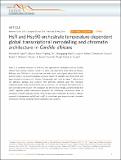Hsf1 and Hsp90 orchestrate temperature-dependent global transcriptional remodelling and chromatin architecture in Candida albicans
Author(s)
Leach, Michelle D.; Tan, Kaeling; Miao, Zhengqiang; Walker, Louise A.; Cuomo, Christina A.; Wheeler, Robert T.; Brown, Alistair J. P.; Wong, Koon Ho; Cowen, Leah E.; Farrer, Rhys; ... Show more Show less
DownloadHsf1 and Hsp90.pdf (2.678Mb)
PUBLISHER_CC
Publisher with Creative Commons License
Creative Commons Attribution
Terms of use
Metadata
Show full item recordAbstract
Fever is a universal response to infection, and opportunistic pathogens such as Candida albicans have evolved complex circuitry to sense and respond to heat. Here we harness RNA-seq and ChIP-seq to discover that the heat shock transcription factor, Hsf1, binds distinct motifs in nucleosome-depleted promoter regions to regulate heat shock genes and
genes involved in virulence in C. albicans. Consequently, heat shock increases C. albicans host cell adhesion, damage and virulence. Hsf1 activation depends upon the molecular chaperone Hsp90 under basal and heat shock conditions, but the effects are opposite and in part controlled at the level of Hsf1 expression and DNA binding. Finally, we demonstrate that Hsp90 regulates global transcription programs by modulating nucleosome levels at promoters of stress-responsive genes. Thus, we describe a mechanism by which C. albicans responds to temperature via Hsf1 and Hsp90 to orchestrate gene expression and chromatin architecture, thereby enabling thermal adaptation and virulence.
Date issued
2016-05Department
Broad Institute of MIT and Harvard; Massachusetts Institute of Technology. Department of BiologyJournal
Nature Communications
Publisher
Nature Publishing Group
Citation
Leach, Michelle D. et al. “Hsf1 and Hsp90 Orchestrate Temperature-Dependent Global Transcriptional Remodelling and Chromatin Architecture in Candida Albicans.” Nature Communications 7 (May 2016): 11704
Version: Final published version
ISSN
2041-1723